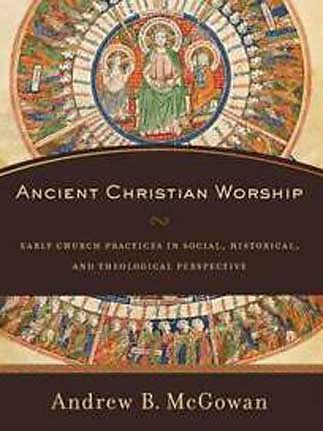
Ancient Christian Worship: Early Church Practices in Social, Historical, and Theological Perspective
Andrew B. McGowan
Baker Academic, 2016; 320 pages
![]()
For the past several decades it’s been in vogue to speak of “returning to New Testament church practices.” Such conversations, though well-intentioned, typically generate more heat than light. Most of us actually know very little about early church practices and even less about the cultural context required to understand them.
It’s for this reason that Andrew McGowan’s book Ancient Christian Worship is a potentially helpful historical resource. The book discusses all aspects of corporate worship in the early Christain church: the Lord’s table, the ministry of the Word, music, baptism, feasts and fasts, and daily prayer. McGowan is an Anglican priest and Dean of the Berkeley Divinity School at Yale, and his area of scholarship is the early church, particularly ritualistic practices involving food and drink. The section of this volume that deals directly with music is scarcely twenty pages, but in it, McGowan deftly covers a great deal of original source material regarding hymnody, psalmody, early choirs, and instrumental music in the early church. His citations show a breadth of study in ancient literature that is impressive.
McGowan is an unapologetic theological liberal and, at points, a less-than-subtle apologist for Gnosticism. As such, he routinely favors early dates for gnostic writings, while repeating familiar liberal tropes regarding higher criticism and the political origins of the canon. These practices render large portions of his volume deeply suspect— a baffling combination of careful scholarship and unfounded assumptions.
So why 3 stars? Because despite its proclivities toward spurious liberal narratives, McGowan’s book is a helpful resource for anyone wanting to study the practices of the early church. The bibliography alone is worth the price of admission. With a discerning eye, a student of church history will certainly benefit from McGowan’s work.
